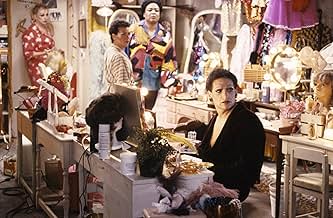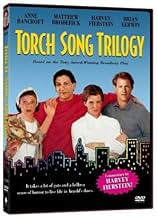CALIFICACIÓN DE IMDb
7.8/10
8.2 k
TU CALIFICACIÓN
Arnold es un hombre gay que trabaja como drag queen en la ciudad de Nueva York en 1971. Conoce a un apuesto hombre bisexual.Arnold es un hombre gay que trabaja como drag queen en la ciudad de Nueva York en 1971. Conoce a un apuesto hombre bisexual.Arnold es un hombre gay que trabaja como drag queen en la ciudad de Nueva York en 1971. Conoce a un apuesto hombre bisexual.
- Premios
- 1 premio ganado y 3 nominaciones en total
Axel Lott
- Marina Del Rey
- (as Axel Vera)
Opiniones destacadas
A notable film on several levels. First, it was way ahead of America in being a relatively mainstream film that treated gay men as people of depth, value, humor and worth making a film about. (Although there is sad irony in the fact this huge hit play took so long to make it to the screen that AIDS had already totally altered the landscape by the time of its release. That's something the film only notes in the closing credits, and gives it a bit of a 'rose colored glasses' hue).
But beyond any politics or social significance this is also a very well acted, funny and moving look at one man, Arnold, (played by the unique and charismatic Harvey Firestein, who wrote the play and screenplay) as he looks for love – both romantic and familial in a sometimes very cold world. If Firestein's performance can occasionally feel theatrical, it's also entirely appropriate for the starting-to-age drag queen performer he plays. What's wonderful is how Firestein always keeps the humanity under Arnold's occasional flamboyance very alive, as does Anne Bancroft as his 'difficult' mother. Later in her career Bancroft could tend towards theatricality on screen as well, but she tones it down just enough to feel real here, and anyway, lets face it, next to a drag queen, who is more innately dramatic than a Jewish mother? (I grew up with one, trust me).
Matthew Broderick and Brian Kerwin also do very good work in support, Broderick as a sexy but understated young man totally at ease with his sexuality, and Kerwin as a confused bi- sexual trying to work out his. While never rising to the level of a great film (the direction is very straightforward and bland, there's almost a TV movie look to it, it never completely surpasses it's theatrical origins), it's certainly a good, touching, human, and important one – although to a generation growing up with the reality of gay marriage and deeper integration of gay people into society, some of the historical importance may be lost. But not the essential, timeless embrace of kindness, love, respect and understanding
But beyond any politics or social significance this is also a very well acted, funny and moving look at one man, Arnold, (played by the unique and charismatic Harvey Firestein, who wrote the play and screenplay) as he looks for love – both romantic and familial in a sometimes very cold world. If Firestein's performance can occasionally feel theatrical, it's also entirely appropriate for the starting-to-age drag queen performer he plays. What's wonderful is how Firestein always keeps the humanity under Arnold's occasional flamboyance very alive, as does Anne Bancroft as his 'difficult' mother. Later in her career Bancroft could tend towards theatricality on screen as well, but she tones it down just enough to feel real here, and anyway, lets face it, next to a drag queen, who is more innately dramatic than a Jewish mother? (I grew up with one, trust me).
Matthew Broderick and Brian Kerwin also do very good work in support, Broderick as a sexy but understated young man totally at ease with his sexuality, and Kerwin as a confused bi- sexual trying to work out his. While never rising to the level of a great film (the direction is very straightforward and bland, there's almost a TV movie look to it, it never completely surpasses it's theatrical origins), it's certainly a good, touching, human, and important one – although to a generation growing up with the reality of gay marriage and deeper integration of gay people into society, some of the historical importance may be lost. But not the essential, timeless embrace of kindness, love, respect and understanding
Award winning writer actor Harvey Fierstein portrays a shy and loveless cabaret artist who comes to terms with his bisexual lover, with the man of his dreams, and finally (in a heartbreaking confrontation sure to leave a lump in even the most stoic of throats) with his homophobic, harpy mother. The strengths of the film are those of any adapted stage play, but this isn't just another theater piece arbitrarily transferred to the screen. The original three acts have been married into one sustained narrative, with the cosmetic benefits of skillful editing and camera-work to help smooth the rougher transitions. Of course it's Fierstein himself who holds the film together, showing a wonderful, subtle blend of confidence and insecurity, with eloquent body language and expressive facial tics reminiscent of Charlie Chaplin, and with a voice best described as unique.
10sibie
This film is very deep and superbly acted. It requires a viewer with a heart, but once you got that working you will surely fall into this touching drama. What is most appealing about this film is its realism and the fact that scenes of heartfelt drama are followed by light hearted humour, leading one easily through this well designed
Torch Song Trilogy is so called because its acts were originally presented one-by-one, months apart, at the off-Broadway La Mama Theater. It is done with a sparse set and few props, letting the incredibly funny, amazingly touching script fuel the play.
The movie version is done much more realistically, and it works! Things that are merely discussed in the play are shown to viewers. The cast is wonderfully realistic (Brian Kerwin is a bit stiff, but it works for the character of Ed.) and the script is just as good as the stage play. So many books and plays are adapted into something that is barely recognizable, but Fierstein makes his own script into something even more special.
The story benefits from the larger scope allowed by the movie.
We get to SEE the drag club, the bars, Arnold's (bunny-motif) apartment, Ed's country house and other locations merely hinted at in the play. The scenes that take place during and after the visit to the country house are somewhat confusing on stage, performed in a huge bed, but are beautifully edited in the movie. Best of all is Arnold's best friend, Murray, only talked about in the stage production. But in the movie, he's brought to magnificent life by Ken Page, filling the screen with his usual warmth and wit.
Harvey Fierstein has said that he hopes TST is like an Indian dress, made beautiful by all the little mirrors that decorate it. And truly, it is seeing and hearing *ourselves* that makes this script sparkle. You don't have to be a female impersonator to understand love and loss and laughter. This is NOT just a movie for gay men.
The movie version is done much more realistically, and it works! Things that are merely discussed in the play are shown to viewers. The cast is wonderfully realistic (Brian Kerwin is a bit stiff, but it works for the character of Ed.) and the script is just as good as the stage play. So many books and plays are adapted into something that is barely recognizable, but Fierstein makes his own script into something even more special.
The story benefits from the larger scope allowed by the movie.
We get to SEE the drag club, the bars, Arnold's (bunny-motif) apartment, Ed's country house and other locations merely hinted at in the play. The scenes that take place during and after the visit to the country house are somewhat confusing on stage, performed in a huge bed, but are beautifully edited in the movie. Best of all is Arnold's best friend, Murray, only talked about in the stage production. But in the movie, he's brought to magnificent life by Ken Page, filling the screen with his usual warmth and wit.
Harvey Fierstein has said that he hopes TST is like an Indian dress, made beautiful by all the little mirrors that decorate it. And truly, it is seeing and hearing *ourselves* that makes this script sparkle. You don't have to be a female impersonator to understand love and loss and laughter. This is NOT just a movie for gay men.
I absolutely love this movie. It certainly was created for gay men, but as a lesbian, I feel a kinship with other gay people, and I believe this is an excellent movie. The depiction of female impersonators is genuine, and doesn't give the false glamourpuss view that probably causes many outsiders to think all drag queens are just like RuPaul (nothing against her, she's a diva, but not everyone has so much money!). The portrayal of a relationship involving one gay person and one bisexual person is also beautifully realistic. Ann Bancroft's performance as the Ma is stunning. I believe this movie would also appeal to open-minded heterosexuals who may not have too much involvement with our culture, as it depicts a grittier side of life than the commonly-seen rich gay boy lifestyle. (Movie viewers with an eye toward the cinematography of films will also enjoy the artistry presented here.)
¿Sabías que…?
- TriviaEstelle Getty originated the role of Ma Beckoff on Broadway. She was unavailable filming The Golden Girls (1985) as Sophia, Dorothy's mother, to reprise the part for the movie so Anne Bancroft was cast instead.
- ErroresArnold hires a car service to take him and Ma to the cemetery, and the car is seen waiting for them. But when Ma storms off and leaves in the car, it's not the same driver that brought them to the cemetery.
- Bandas sonorasDames
Music by Harry Warren
Lyrics by Al Dubin
Performed by Harvey Fierstein (uncredited), Ken Page (uncredited), Charles Pierce (uncredited), Axel Lott (uncredited), Nick Montgomery (uncredited), Robert Neary (uncredited), and Harriet C. Leider (uncredited)
© 1934 (renewed) Warner Bros. Inc. (ASCAP)
[Performed in the drag show during the opening credits; reprise in the first 1973 scene]
Selecciones populares
Inicia sesión para calificar y agrega a la lista de videos para obtener recomendaciones personalizadas
- How long is Torch Song Trilogy?Con tecnología de Alexa
Detalles
- Fecha de lanzamiento
- País de origen
- Idiomas
- También se conoce como
- Torch Song Trilogy
- Locaciones de filmación
- Productoras
- Ver más créditos de la compañía en IMDbPro
Taquilla
- Total en EE. UU. y Canadá
- USD 4,865,997
- Fin de semana de estreno en EE. UU. y Canadá
- USD 70,022
- 18 dic 1988
- Total a nivel mundial
- USD 4,870,903
- Tiempo de ejecución2 horas
- Color
- Mezcla de sonido
- Relación de aspecto
- 1.85 : 1
Contribuir a esta página
Sugiere una edición o agrega el contenido que falta

Principales brechas de datos
By what name was Jóvenes corazones gay (1988) officially released in India in English?
Responda




























